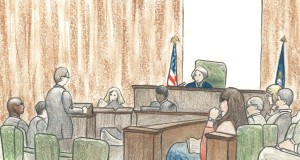Jeffrey Sterling’s lawyers submitted their sentencing memo in anticipation of his sentencing May 11. Not only do they remind Judge Leonie Brinkema of the punishments of people recently sentenced for what started as Espionage charges — roughly 3 years in John Kiriakou and Stephen Jin-Woo Kim’s cases, and (of course) probation in David Petraeus’ case.
But they point out that punishing leakers isn’t what the Espionage Act was supposed to be for.
[W]hile it is clear that the conduct the jury found supported these convictions was not classic espionage, the Guidelines were written with espionage in mind. That fact alone justifies a significant downward departure. In this regard, the Court should be mindful that while the Government has successfully charged “leakers” under the Espionage Act, its legislative history would not support such charges.
[snip]
As previously noted to the Court, the ten-year statute of limitations applicable to Espionage Act cases can also be attributed to fears of a Communist movement.
[snip]
The point is not to cast doubt upon the wisdom of the Espionage Act. What is critical, however, is for the Court to see Mr. Sterling not as a spy or a communist who committed espionage in the sense that the Guidelines were established to punish. Mr. Sterling was convicted, under the Espionage Act, for “leaking” information to a reporter.
And perhaps to distinguish Sterling’s leaking from real espionage, the defense points to a letter submitted by a witness the government itself was going to call in the trial, David Manners. It appears Manners was the witness to whom the government once claimed Risen had identified Sterling as a source, though Manners’ letter makes clear that he “could not confirm to the government that Risen had identified Sterling as the source of the information that appeared in his book.”
Manners — who worked as an Operations Officer for the CIA for 20 years, in several areas, including Soviet nuclear weapons and Iran, relevant to this case — wrote to dismiss the government claims of damage as “not credible.”
He notes that Los Alamos National Labs and Arzamas 16, the Russian lab where Merlin once worked, had a partnership starting in 1992, before Merlin even started working for the CIA. “I don’t doubt that Merlin provided useful information to the United States,” Manner judges, but “it seems unlikely that this information was as singularly vital as the government suggests.”
He also mocks the idea that the Russians might harm Merlin. “The Russians are not going to harm an émigré scientist, one of many such scientists who relocated to the U.S., who worked at a facility that had been open to us since the 1992 [agreement].”
Then, Manners dismisses government claims about how much Risen’s book hurt CIA’s efforts to recruit spies.
It is not credible to suggest that the public disclosure of a human asset “severely undermines” our ability to recruit other foreign assets. While such disclosures are never helpful, they happen all the time (and sometimes the United States quietly endorses the disclosure — read some of Bob Woodward’s books, or look at Agency collaboration on the film about the Bin Laden raid. I note that Merlin was recruited not too long after Aldrich Ames was arrested as a Soviet/Russian spy. The nightmarish revelations of what Ames did (which were trumpeted around the world) seem not to have affected Merlin’s willingness to work with us.
Then, finally, Manners notes how common deception operations have been, going all the way back to the Trojan War. “I do not think that [the Iranians] or anyone else in the world would be surprised that the United States is capable of conducting sophisticated counter-proliferation programs,” Manners judges, invoking public discussions of StuxNet.
“The purpose of this letter is not to condone leaks of classified information,” Manners closes his letter, “rather, my purpose is simply to put the issues in proper context so that the Court can base its decisions on fact, rather than overwrought hyperbole.”
Usually, Judges don’t take accusations of overwrought hyperbole very seriously. After all, the law grants the Executive Branch broad discretion to present whatever kind of overwrought hyperbole their Original Classification Authorities engage in (as happened in Sterling’s trial when CIA witness Martha Lutz claimed a document on dialing rotary phones was classified).
But this is a witness the government itself claimed had expertise on the issues at hand.
And after all — as the defense argues — this case wasn’t about espionage, it was about leaking.



